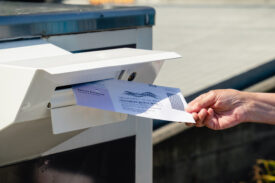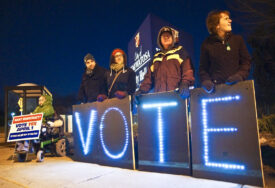In 2013, when then-state senator Ed Murray was running for mayor of Seattle, his campaign asked Microsoft for the maximum allowed political contribution, which was $700 that year, and the company obliged. Murray was not alone in benefiting from Microsoft’s largesse: the software maker distributed similar contributions to a bevy of candidates that year and in the years since: $4,600 in the 2013 and 2015 elections combined, making it one of the biggest donors in the city.
What makes Microsoft’s political giving different than the giving of many other local donors is that the company not only pays money into city campaigns, it also makes money from its dealings with the city. A month after Mayor Murray’s election, for example, the City of Seattle awarded the Redmond-based software behemoth a $46,000 contract for technical support of the mayor-elect’s transition team. Other Seattle city contracts brought the company an estimated $2.2 million between January 2013 and the middle of 2015.
Political fundraising from large city contractors such as Microsoft may or may not give undue influence to those contractors in the actual practice of awarding, extending, and evaluating contracts, but it certainly raises questions. Did the person who awarded that contract know of the company’s generosity to the mayor-elect’s campaign? Did anyone place a phone call? Did anyone put a finger on the scale?
Banning “pay to play”
Contractor contributions create the danger of corruption. They also create the danger of the appearance of corruption. The former clearly harms democracy, but even the latter degrades trust in public institutions. That’s why corruption or its appearance are the two conditions—the only two—that US federal courts have accepted as legitimate reasons to constrain Americans’ otherwise sacrosanct right to unlimited free political speech, which the courts have defined to include the right to throw money around.
In short, the Microsoft-Murray story, whether there’s something rotten in it or not, still smells fishy. Cases like it explain why cities and states across North America have banned or limited “pay-to-play” contributions: contributions that public contractors give to candidates as a routine cost of business.
Northwest jurisdictions have yet to adopt pay-to-play rules, but Honest Elections Seattle, I-122 on the Seattle ballot next month, would begin to rectify this weakness in the region’s election safeguards. It would ban political gifts from contractors who have earned at least $250,000 in city contracts over the preceding two years.
$28,000 ➜ $84 million
To better reveal how Honest Elections Seattle would break the circuit that moves city money between contractors and city candidates, Sightline analyzed all city contracts and all political giving between January 2013 and October 9, 2015. We found that 22 contractors made political contributions and also earned enough to have triggered the ban, had it been in effect. (See the note on methods below.) All told, these 22 companies earned an estimated $84 million from city contracts between January 2013 and June 2015.
Microsoft gave the most, at $4,600, followed by engineering giants CH2M Hill ($3,400) and HDR Engineering ($3,100). The latter two engineering firms each earned on the order of $18 million from city contracts during the period. Each firm had plum contracts related to sewerage upgrades and the city’s Alaskan Way Viaduct replacement project. Both firms demonstrated their ecumenical, give-some-to-get-some attitude by donating near the maximum allowed to both candidates for mayor in 2013: then-senator Ed Murray and then-mayor Mike McGinn.
Among the 22 contractors that would have been hit by I-122 had it been in effect, contributions totaled more than $28,000, accounting for 0.4 percent of political dollars collected during these two city elections (thus far). It may not sound like much. On the other hand, on average, each donor averaged more than $1,000, which puts contractors among the city’s most elite contributors—the 391 donors who gave more than $1,000 in the 2013 election.
Top Pay-to-Players
The top ten contractor-contributors (see table below) are dominated by engineering and design companies hired by the city to do major highway, sewerage, and road redesign projects such as the Mercer Street and Alaskan Way rebuilds. These ten biggest donors together contributed more than $20,000 to candidates for mayor, city council, and city attorney in 2013 or for city council in 2015 (through early October).
Seattle’s Top Pay-to-Play Donors Earned $51 Million.
| Contractor-Contributor | Contributions | City Contract Earnings (est.) | City Contract Purposes | Candidates Given at least $650 |
| Microsoft | $4,602 | $2.2 million | Tech support | Richard Conlin (council),
Ed Murray (mayor) |
| CH2M Hill | $3,400 | $18 million | Waterfront (viaduct replacement), sewer upgrades | Mike McGinn (mayor),
Ed Murray, Sally Bagshaw (council) |
| HDR Engineering | $3,100 | $17.8 million | Sewer upgrades, viaduct replacement | Mike McGinn,
Ed Murray, Rob Johnson (council) |
| Marianne Bichsel | $2,013 | $251,000 | Communications | |
| HNTB Corp. | $1,850 | $8.8 million | Mercer Street Corridor project | Richard Conlin,
Rob Johnson |
| David Evans & Assoc. | $1,500 | $937,000 | Road improvements | Ed Murray |
| Kalispel Tribe | $1,400 | $280,000 | Fish study Pend Oreille River | Ed Murray,
Debora Juarez (council) |
| K&L Gates | $1,388 | $368,000 | Not posted | Ed Murray |
| Griffin, Hill & Associates, LLC | $1,300 | $341,000 | Training plans for sewer upgrades | |
| MacDonald-Miller | $1,200 | $1.6 million | Building energy retrofits | Mike O’Brien (council) |
The City of Seattle is not corrupt like the old political machines in New York or Chicago, but city agencies routinely award contracts worth hundreds of thousands or millions of dollars to businesses. For the elected officials who oversee those agencies, or those who aspire to do so, to be phoning the self-same businesses in search of $700 checks is, at best, unseemly and, at worst, an invitation to graft.
That’s why jurisdictions across the continent have forbid or constrained the practice. By adopting I-122, Seattle would join the cities of Los Angeles and San Francisco, the states of Connecticut and New Jersey, and the US federal government, along with others listed in the table appended below, in banning pay-to-play.
The Norm of Reciprocity
When Ed Murray was running for mayor in 2013, I suspect he had no idea how much money Microsoft was making on its city contracts. He just needed funds for his campaign, so he called—or some campaign worker called—and asked for a contribution. Or Microsoft’s government affairs director attended a fundraiser and brought a check. And later, the city awarded contracts to Microsoft, perhaps completely uninfluenced by the company’s generosity to city officials. The same goes for CH2M Hill, HDR Engineering, and the rest of the city’s 22 big-earning contractor-contributors.
On the other hand, people tend to remember those who are generous to them. They tend to feel grateful. They tend to feel disposed to reciprocate. In fact, the norm of reciprocity is among the most powerful of human instincts, so contractor contributions are worrisome even if no contributor ever asks an elected official for a favor. The best analyses of money-in-politics explain its influence without any horse trading or quid pro quo corruption at all. Rather, the system of winning office by dialing-for-dollars creates familiarity and implicit biases that advantage the moneyed and connected, prominently including the contractors who—knowing exactly what they are doing—patiently and assiduously cultivate city hall with big checks.
Honest Elections Seattle prevents this systemic corruption by putting a wall between candidates and contractor money. Under I-122, contractors are welcome to use Democracy Vouchers on the same terms as all other voters in the city. But if they’ve earned a quarter million dollars doing the city’s business in the past two years, it tells them to sit out the check-writing season.
The logic is simple: If elected officials are writing your meal ticket, they should not be taking your money. I-122 makes that principle law in Seattle.
Thanks to Sightline’s Margaret Morales for researching this article.
Appendix:
Many Governments Limit Pay-to-Play Contributions. |
|
| Jurisdiction | Policy |
| Chicago | No person who has done business with the City (defined as contracts totaling over $10,000 in any 12 consecutive month period) in preceding 4 reporting years, or seeking to do business with the city, shall contribute over $1,500 in a calendar year to any candidate for City office. (Chapter 2-156-445, pg 45) |
| Houston | No contributions from entities with contracts of more than $50,000 to any candidate during period from first day bids were accepted through and up to 30 days after award of contract or decision to not award. (Article IV Sec 18-36) |
| Los Angeles | No contributions from contractors with contracts worth more than $100,000. (Charter Volume I: Article IV: Sec. 470 (c) 12) |
| New York | Entities that have or are bidding on city contracts aggregating at least $100,000 ($500,000 for construction) over 12-month period are limited to make contributions of no more than $400 to city-wide races, $320 for borough-wide races, and $250 for City Council races. (NYC Administrative Code §Sec 3-703 (o)) |
| Newark | No No-Bid contracts worth more than $17,500 may be given to any business entity which has made over $300 in contributions to any one candidate, or $3,000 in aggregate contributions, within one year prior to award date. (Executive Order No MEO-07-0001) |
| Oakland | No contributions from potential contractors with contracts over $15,000 “at any time between commencement of negotiations and either one hundred eighty (180) days after completion of, or the termination of, negotiations.” (Title 3: Sec 3.12.140) |
| Salem, NJ | No contributions from contractors with over $100,000 in city contracts; No contracts worth $100,000 or more per year awarded to any entity that has made campaign contributions to any candidate “having ultimate responsibility for the award of a contract”; the monetary thresholds include contributions over $300 to mayoral candidate or $500 to any joint candidates committee. (Salem City Ordinance 1103) |
| San Francisco | No contributions from entities with contracts worth over $50,000 in a fiscal year. (SF Campaign and Governmental Conduct Code Sec 1.126) |
| Connecticut | No contributions from state contractors where the contract is worth at least $50,000 or where a set of contracts is worth at least $150,000. (Title 9, Chapter 155, 612 (g)) |
| Hawaii | No contributions from entities that hold state contracts from the date of execution of the contract to the date of its completion. (HRS §11-355) |
| New Jersey | The State will not enter into a contract over $17,500 if the business entity has made any political contribution to any candidate within the 18 months immediately preceding the commencement of negotiations for the contract, during the Governor’s term, or within 18 months preceding end of Governor’s term.
Prior to receiving contracts, entities must file disclosure statements of all contributions within previous 4 years. (Public Law 2005, Chapter 51, C.19:44A-20.14) |
| US Federal Government | No contributions to federal candidates from contractors at any time between commencement of negotiation for contract and either completion of contract or termination of negotiations. (Title 2: §441 (c)) |
Note on methods: To analyze the impact I-122 would have on Seattle campaigns, Sightline conducted a study of city records on contracting and contributions. We filed a public records request with the city and received a database of all fee-for-service contracts awarded by the city that were in effect between January 2013 and the end of June 2015. Because the database proved somewhat out of date in places, we spot checked it against the public postings of city contracts. Because each contract has a different start and end date, we calculated the average per-month payment rate implied in each contract, assuming a steady pay-out across the period of the contract, and calculated the likely earnings between the beginning and end date of our study period. For all entities whose contracts with the city suggested earnings of $250,000 or more during the period in question, we then searched the online political contribution database for city candidate races (for mayor, city attorney, and city council) maintained by the Seattle Ethics and Elections Commission (SEEC). We included contributions posted on the SEEC website through October 9, 2015. We included contributions from the contracting entities themselves and from their wholly controlled political action committees. We excluded contributions made in the 2009 and 2011 election cycles which candidates carried over to the 2013 or 2015 cycle—a practice since banned by the city council and therefore not relevant to I-122’s impact in the future.








David Kershner
Thank you, Alan and Margaret, for this informative post. I am little surprised that Portland does not have pay-to-play restrictions. Hopefully, voters will approve I-122 and the City of Roses will follow Seattle’s lead.